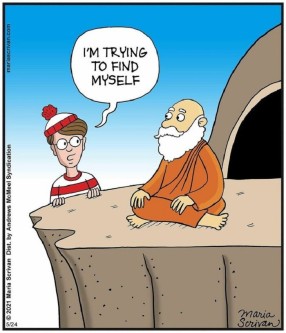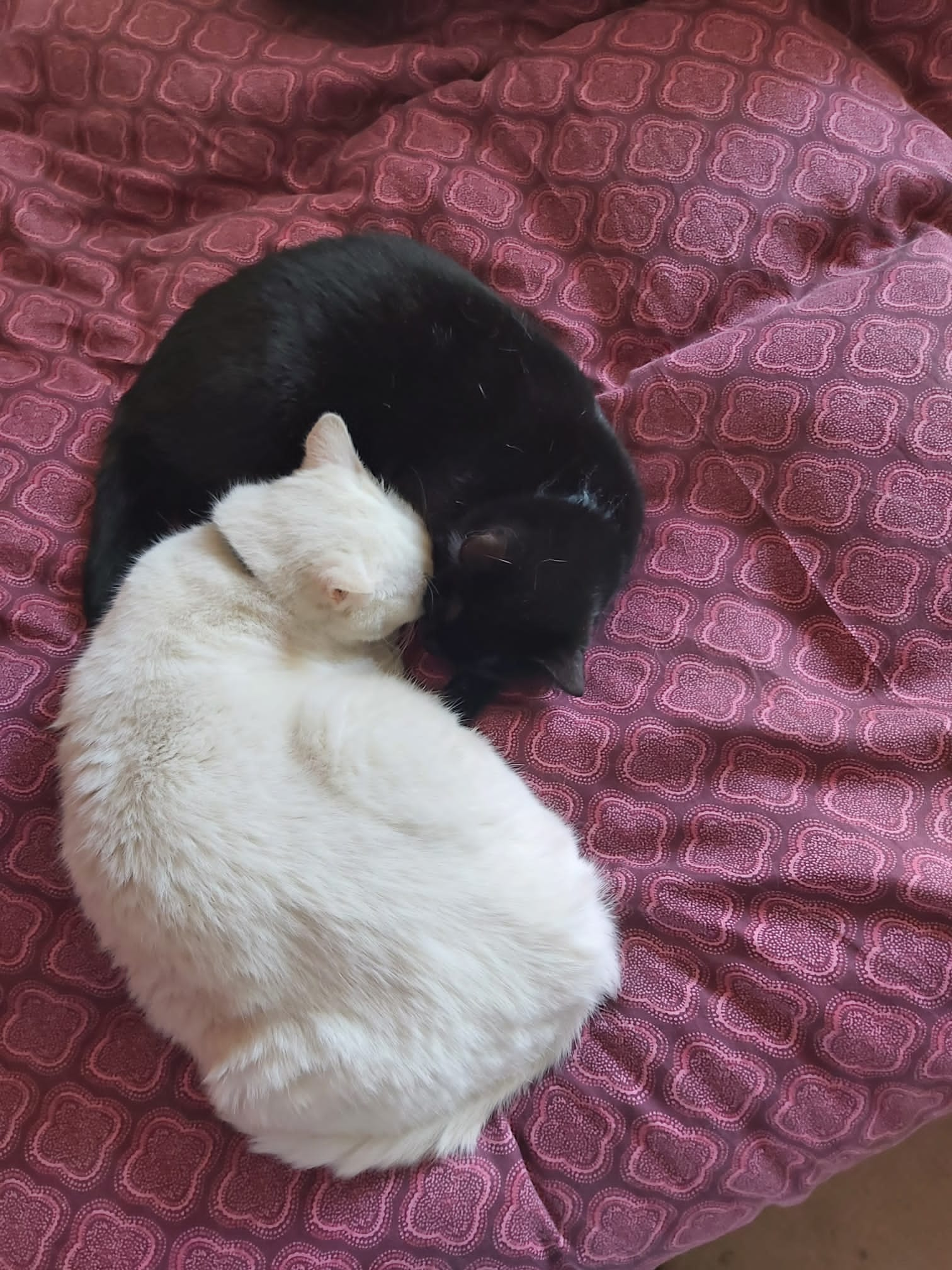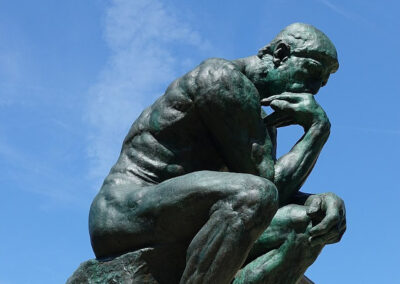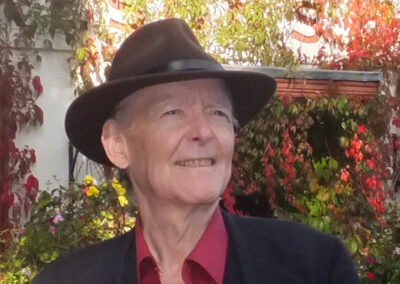
‘Reflection’ merits pride of place on the plinth now occupied by ‘Meditation’.
Marcus Aurelius, the Roman Emperor, wrote ‘Meditations‘ but nowadays it would be better described as ‘Reflections‘. The word ‘meditation’ seems to have acquired a capital ‘M’. It has an orientation towards the oriental. Westerners have a vantage point on cogitation that has been long in the brew. Excellent and varied as are Eastern traditions it behoves us to tread warily on some of their wilder shores. The time is ripe for Reflection to come back into its own. We can borrow from the best of both traditions.
Eastern-style Meditation, in the sense now generally understood, has techniques that range from breathing exercises and mantras to help muffle the ebb and flow of thoughts and transport votaries to a far-reaching destination, reaching into Essence, reaching to the Stars. Finding Yourself, ridding oneself of petty concerns, excising individual personality and so forth come into it. It ideally leads to a peak of joy. Who would say ‘No’ to that! Pity the man who wallows a lifetime in the shallows without dipping a toe into such happiness. Some forms of Meditation may bring about all that is claimed of them but on occasion might this Wish List be a bridge too far?
Sir Harold Nicolson, with the eighteenth century in mind, stated: ‘Once the sober and excellent organised disciplines of religion are removed, the resultant vacuum is filled by frivolous ideas and cabalistic superstitions’. It is a sceptical starting point from which to reflect on the trends. Much is to be said, of course, for infusing ourselves into a cosmos-lit upland that owes much to faiths originating in the East. There doubtless can be such a tip-top type experience for the asking but some people might pause a moment. Will it follow to order from a belief in this goal? Truly enlightened people know their own exalted minds but ordinary folk surely need to think long and hard before being over-ambitious against their better judgement. The impressive target of a form of supra-consciousness! Ecstasy! Nirvana! A metamorphosis of sorts! Yes, please! Unless – perish the thought! – a soupçon of self-delusion is involved. Splendid as it is to travel ‘there’, some people without their realising it may not see that, in Alice B. Toklas’ phrase, ‘When one gets there, there is no there there!’
Is that very shocking to suggest?
We should be as certain as possible about why we want to do things.
A large part of why people like to meditate is because they recognise a need to set apart a space to do an unostentatious thing, reflection. How many of those who go in for a Meditation Session separate this goal from that which they might have wanted to achieve, unschooled and uninfluenced by others? Reflection – in the ordinary sense of the word – can be the ingredient that takes one where one really wants to go. It has no need to call into play the bru-ha-ha of cult or ritual.
People like a ‘purpose’ that is respectable, justifiable. The fons et origo of their wish can be to simply sit quietly and reflect on life. Meditation as a practice – as often conceived nowadays – can come from that deep-seated wish. It happens that, without clarifying the distinction, we tend to conflate a fashionable idea about meditation with the humbler goal of what we may wish to achieve. A prejudice has crept in against, for instance, silently staring into space. It is fine today to say ‘I am doing my Meditation’. We may not be following our own lodestar – our own wish – as much as we like to think when we go in for Meditation with all its’ bells and whistles.
The wish to be an observer of ourselves is enjoined on us in some Meditation systems. The crux idea in this context is to look down on ourselves and see ourselves from an outside perspective. It may be that it is the perspective of being an observer, itself, rather than plumbing the deeps for a picture of our place in the universe, that is the key to this. It can be that we just want to get things in proportion, get a handle on our attitudes, see things from the standpoint of what matters when it comes to our lives on this earth, rather than when set against the eternal truths of our spirit.
Is it de rigeur to undergo the rituals – however pragmatic their basis – of much of the approved preparation for Meditation?
Take ‘clearing the mind’ to quiet the onrush and jumble of thoughts that often close in on us if we want to have a stillness of mind: sometimes it is the stillness itself that we want rather than to actually stop our thinking. This deluge of ideas and emotions is what we are often told takes us away from our essence. It may be the case but why throw the baby out with the bathwater? Why are our own thoughts such an enemy that we should strive to get rid of them altogether even for a short while? Our stream of consciousness is one of the things that make us human. Our feelings are a large part of us. Heart, brain and, no doubt, guts all are a factor in our unqiue consciousness. It might come from an animating spirit that lies behind the physical organs that laboratories identify as a locus. A slowing down of the mind as per much of prescribed Meditation is controversial if taken too far, for all its vogueishness. Thinking is human; and we are human. ‘I think, therefore I am‘, says Rousseau. Dr Johnson, the great diarist, had a point when decrying a stoppage in the track of thought: ‘The cow in the field (if it could talk) would say: here I am in this field with this grass, ‘what being could enjoy greater felicity’?’
A pillar of Meditation is to get into the right frame of mind. That preparation may feed a need simply to ease up on the throttle. A slight shift from the norms of timetabled active life to take time out for Reflection can suffice to get one’s brain and thinking processes in order. A lit candle, say, or some gentle background music put on – Musak, say, but preferably not singing, which tends to be more intrusive. Some Meditation sects in the East kick-start sessions with a bout of belly-laughing to ginger participants into a happy mood and generally imbue their thinking with a sense of proportion. How these groups are able to belly-laugh on cue isn’t too clear; perhaps a Swami doubles as a stand-up comic or a Master of Ceremony calls out a number from a shared list of jokes consensually found hysterically funny? Meditators in the West tend not to overdose on slapstick and aim for calm equilibrium of mind, as do indeed most people who wish to reflect.
In general terms, is there a difference between the mindset of the East and that of the West?
The global village has been urbanised. New age people, South American tribes, people from far afield in the East share cyber-space with the First World when being drawn to Meditation. It can be that our fundamental thinking wells out of a Collective Unconscious, as Karl Jung posited. If so, it seems odd that there is a single Collective Unconscious. Did it exist at the time, for instance, that the major religions were founded when there was no communication whatsoever between peoples separated by vast distances. Are there different Collective Unconsciousness-es or aspects of a Collective Unconscious that are more accentuated in one region rather than another? One way or the other, there are arguably differences in the wellspring of thinking that distinguishes the East from the West…
There are learned studies on the difference between Eastern Meditation and Christian Meditation. In Eastern Meditation, as Madeline Pena observes, the goal is to empty one’s mind with the intention to connect with essential nature. Christian meditation has the goal of filling one’s mind with Scripture with the intention to connect with God. In terms of different personality type, it is held for instance by Christophe Allain that an alignment of chakras comes more readily to a person of Eastern background when seated without movement whereas this chakra alignment works to better effect in his Western counterpart when engaged in athletic activity.
Many and controversial may be the supposed differences in the mind-sets of people around the globe. Whatever the political correctness, most think that there in general are different types of thinking going on in different countries or continents. For present purposes, a towering authority is Karl Jung. His view was that the oriental psyche is more oriented towards understanding man’s nature than the psyche of the Occident which is more directed towards the exterior world. The Orient has a spirituality of self-deliverance centred on man whereas the mainly Christian Occident is moved more by a faith in a Divine exterior. The Oriental wants to finalise or complete man’s sense of the world by an affirmation of the spirit that is facing the material world. He looks for a true sense in man’s nature. Man, here, is the measure of self-realisation. The Occidental faces outward or upward towards Divine revelation. They are complementary. Vive la Difference! Or, indeed: Vive plussieurs des differences! That said, some Oriental teachers like Lama Chogyam Ripoche in 1971 laid into would-be devotees of Eastern traditions going as far as to refer to ‘the spiritual materialism of the Occidentals who ‘consume’ Oriental spiritualities to nourush their egos like they consume everything else.’

A question of ego – of who are you and I? – is among the differences in what is here called the Eastern from a Western approach. Jung wrote: ‘It is through our emotions and feelings that we have consciousness of ourselves with the strongest acuteness.‘ Individuation is the name of this game, rather than aiming to trying an find ourselves in an overarching Universal Spirit. There are intellectual problems with this concept in any case, for all the arguably wishful thinking that we may be destined to repair to a strata which for instance may include the cleansed spirit of Adolf Hitler! The goal of being able to direct personal thoughts and then rise above them as an observer, see them for what they are, re-evaluate them much as we can do in dreams recalling them in wakefulness, may tell us sufficient of what we need or want to know about …ourselves, both individually and as a species. It is a far cry from the notion that arose first mainly in the Orient that we need to rid ourselves of our ego, our human feelings, and gravitate to our true essence and our ethereal Home.
Are we trying to run before we can walk?
If a Universal Soul and Enlightenment – by whatever name – is to be our eventual destination (assuming we acquit ourselves favourably in tests of various conjectural stripes for it) why should we try and wrest control of the process. Are we trying to arrogate to ourselves the role of godhead? Prescriptions by gurus and their ilk as to an attainment of enlightenment can hardly go beyond the physical ‘apparatus’, the mortal clay in which men are fashioned. In terms of concepts, too, there may be limits set upon our true, deepest understanding of worlds beyond this earth, and flesh and blood. Buddha accepted that we are grounded on earth and – to what is here called the ‘Western mind’ at least – this is the fact of the matter: why say that what we actually are is somehow ‘wrong’ and we need to do all that we can to rise completely above it. Some parts of the proverbial ‘Bishops’ Egg’ that is our makeup may be excellent.
A ‘Western’ aim of reflection need not be glamorous or ambitious. Common sense and contentment can take precedence over Bliss and Nirvana while we are incarnated as human beings. We can console ourselves that, if nothing else, All good things come to he who waits. We can get our kicks, our ecstasy maybe, elsewhere, without decking it out in exotic robes and philosophies.
What of the idea that we should transcend our ego in Meditation?
One mainstay of oriental meditation is that it is partly designed to uplift a practitioner out of his ego. In the very act of trying to do this, one can concentrate more on oneself than normal. One approach is to become aware of one’s own body. The concentration on self often goes on to the point where is easy to fall into the trap of a form of ego-centricity (as distinct from ‘vanity’) by another name. There is a distinction between ‘what we are in’ and ‘who we are’ and some ‘oriental meditation’ can focus attention on the latter question.
Rishika Anya, as reported in Quora, is a proponent of meditation; it ‘…purifies and replaces (the ego) unifying it with Divine Essence’. Anya refers to some potential pitfalls
‘…the ego senses its imminent end, and it fights back. That’s when the hard work starts. You’ll stare into the mirror and not recognize yourself or know exactly how you got there. Your name/career/lifestyle/partner won’t fit anymore. You’ll see all the toxicity and dysfunction in close relationships and have to struggle with how to handle them. Friends will sense your new energy and feel threatened by it because it touches on their own lies. They start to drift away and loneliness shows up. The ego will whisper to you it’s not worth it. Who did you think you were, anyway, waking up like that? You go to war with yourself…. You will wonder if you’re going crazy. There will be dark nights of the soul. You may feel like an alien in your own body and in a sense you are…’
Ouch!
In ‘reflection’ as normally considered in the West, there is not the same emphasis on the perfecting of the self as is the tendency in ‘Eastern’ approaches; more encouragement is given to a free-wheeling ambit covering a range of subject matter which goes beyond self-absorbtion – salutary as that may be.
When we sink into meditative trances the better to attain self-awareness, we can make a good start by asking whether this is the one and only true goal. What is it that makes ‘me’ tick? What is important to oneself and one’s loved ones, or that which makes the best use of the gifts with which we are personally endowed? We may for instance see a need to fuse a perspective of the long-term with exigencies that arise day by day. This may provide ample matter on which to justifiably reflect.
There may be no certainty anywhere in life and usually the most that is to be hoped is probability. The likelihood is forming of a habit can lead on to the habit becoming second nature. There are advantageous repercussions in any given context of forming the habit of quietly thinking by and for oneself. It may not necessarily lie in the specific conclusions reached during a process of reflecting but in the habit acquired. The more one does of a thing the better at it one gets. Few people think of training intuition but most agree that it comes from one knows not where and quietness of mind can help coax it to the surface of the mind. One can train the mind as well as the memory. Enhancing intuition is not to be done from one day to the next. Spirituality and suchlike intangibles fall into the same category; there is more chance that they can be brought into the open by concentration.
There is a growing backlash against some of the extreme injunctions of Eastern fashion. Frederic Lenoir, to give one example, talks of the widescale self-deception of people who wish to deny their emotions and their essential humanity. (See the ‘Spiritual Matters’ section of this website)
In the Dark Age that preceded the Middle Ages or in the millions of years following the Big Bang before the Cosmic Dawn, there was a protracted ‘foggy’ period, albeit one essential for a gestation to take place. Thus, arguably, with us. Our personal lives in many ways mirror the history of our species. Wandering thoughts may be a form of recapitulation of the chaos from which we emerged before rational conclusions came to light.
Aids to self-contemplation and Meditation may lead to a Greater Truth but there is more than one Greater Truth. One such truth about life is that it should be lived according to exigencies that come up. Rise to the Empyrean, plumb the nature of our Essence, detach from the pettiness of life, scoop up the candy of consumerism, hedonism and materialism, treat the body as a temple, and the rest, all these may lead to profound personal fulfilment. All roads lead to Rome! Especially in the Western world! One aim of meditation – reflection! – can be on a plane suited to the needs of ourselves and of society. It may be only low-hanging fruit but its kernel may lead us to our inherent divine spark.
Let us Reflect when others take time out to Meditate.
***
More about Reflection as defined in this virtual Institute can be found in particular under GUIDING PRINCIPLES and REFLECTION AS AN ACADEMIC SUBJECT .

Above might be a feline interpretation of ‘Ying’ and ‘Yang’; though these terms often are used there are concepts in the West such as ‘Opposites attract’ that all told amount to much the same. Human experience is shared despite differing formulations of it. Thus too with meditiation.







